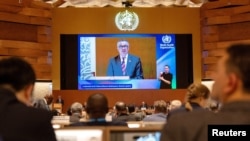The 77th World Health Assembly opened its annual weeklong session Monday on a somber note, as delegates were faced with the task of setting health policies for the year ahead amid mounting challenges to global well-being from multiple crises that, in some areas, threatened to undo decades of progress.
United Nations Secretary-General Antonio Guterres told the assembly by video link from New York that the world is in trouble and global health is suffering “from climate chaos to rising poverty and inequalities, and multiplying conflicts.”
He said more than 20 million children are missing out on routine vaccinations, that dengue and other diseases are increasing from rising global temperatures, and that cholera outbreaks have occurred in more than 20 countries this year alone.
He added that a mountain of evidence indicates that “health is a casualty of war.”
“Millions of people in Sudan and Gaza are at risk of dying — not only from bullets and bombs, but from untreated injuries and disease,” he said. “Unprecedented attacks on health care go beyond anything I have seen in my time as secretary-general.”
In his keynote address to the conference, WHO Director-General Tedros Adhanom Ghebreyesus affirmed much of what Guterres had to say.
“Perhaps the greatest threat to health of our time comes from our changing climate,” he said, adding that the WHO was “supporting countries to build more climate-resilient and climate-friendly health systems.” This, he said, included the “electrification of health facilities with solar energy” in several countries to help mitigate the impact of climate change.
He added, “One of the biggest disruptions caused by the COVID-19 pandemic was to routine immunization programs in many countries, resulting in backsliding coverage and outbreaks of measles, diphtheria, polio, yellow fever and more.”
This, he said, prompted the WHO together with UNICEF and the vaccines alliance Gavi last year in April to launch “The Big Catch Up” scheme to “restore immunization programs at least to pre-pandemic levels.”
Meanwhile, Tedros said WHO emergency medical teams have been responding to health needs in 19 situations of conflict around the world, including Gaza. He said 18 teams are working at all levels of care in north and south Gaza to provide "trauma stabilization, delivering babies, supporting early warning for disease outbreaks, and so much more.”
“In Sudan, more than a year of fighting has left almost 15 million people in need of health assistance,” he said, adding that more than three-quarters of hospitals and almost 90% of primary care facilities are not functioning.
Regarding the war in Ukraine, Tedros said WHO continued to support the country’s health system “which has remained resilient but faces continued challenges,” noting that an estimated 7.8 million people will require health assistance this year.
“In all three situations — and others — we continue to see attacks on health care,” he said. He said the WHO has verified more than 1,500 attacks on health care facilities in 19 countries, leading to 749 deaths and more than 1,200 people injured.
Positive outlook
Looking ahead, Tedros was upbeat at the prospect that an estimated 1.5 billion people were “expected to be enjoying better health and well-being by 2025.”
“This has been achieved by member states working across sectors to address the root causes of ill health: unclean air, unhealthy diets, unsafe water, polluted environments, and products that harm health,” he said.
For example, he noted that tobacco use is declining in 150 countries, and there are now 19 million fewer smokers globally than there were two years ago. He said efforts to improve nutrition and healthy diets are paying off and more countries are taking action to tackle obesity and child wasting, and to scale up breastfeeding.
He said great strides have been made in the treatment of communicable diseases. For example, he said, “More than two million children in Ghana, Kenya, and Malawi have received the first malaria vaccine, resulting in a drop of 13 percent in all-cause mortality among children.”
He said early diagnosis and treatment for tuberculosis last year has saved millions of lives, more than 75% of people living with HIV globally now are receiving antiretroviral therapy, and “We continue to move towards our goal of eradicating polio.”
A major disappointment facing the WHO is its failure to reach a pandemic agreement for approval by the WHA this week. Key articles in the draft text still unresolved include a formula for global sharing of vaccines and medicines during international health emergencies.
Despite the impact, Tedros remains optimistic that an agreement to keep the world safer and contain pandemic threats eventually will be achieved.
“Where there is a will there is a way, so I am still positive, despite the outcome,” he said.





